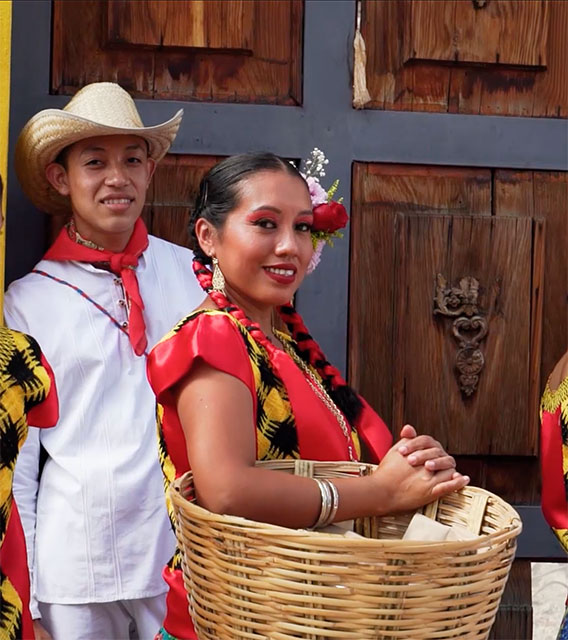The Splendid Textiles of Oaxaca:
A Guelaguetza Festival Celebration

One of the most captivating aspects of the Guelaguetza celebration is the breathtaking textiles worn by participants from each of the state’s eight regions. These textiles are not merely garments; they are woven narratives that tell the stories of Oaxaca’s diverse cultural heritage.
The Rhythmic Heartbeat of Oaxaca:
Music of the Guelaguetza Festival

Oaxaca, often referred to as the culinary heart of Mexico, boasts a vibrant food culture that is deeply rooted in its indigenous heritage and diverse ecosystems. The region’s cuisine is a captivating blend of traditional dishes, unique ingredients, and time-honored cooking techniques.
The Culinary Heart of Mexico:
Exploring the Rich Tapestry of Oaxacan Cuisine & Culinary Arts

Oaxaca, often referred to as the culinary heart of Mexico, boasts a vibrant food culture that is deeply rooted in its indigenous heritage and diverse ecosystems. The region’s cuisine is a captivating blend of traditional dishes, unique ingredients, and time-honored cooking techniques.
Oaxacan Traditions:
Discovering the Art of Handmade Textiles in Oaxaca

Oaxaca is renowned for its vibrant culture, rich history, and exceptional craftsmanship. Among its many artistic treasures, the handmade textiles of Oaxaca stand out.
To Honor Ancestry & Celebrate Life:
The Enchanting Day of the Dead in Oaxaca

The Day of the Dead, a tradition that stretches back thousands of years, is a cherished and captivating celebration in Oaxaca, Mexico. Recognized as Intangible Cultural Heritage, this vibrant and deeply spiritual festivity unites the past with the present, offering a unique glimpse into the rich tapestry of Mexican culture. Rooted in pre-Hispanic practices that worshipped death and paid tribute to the departed through offerings and rituals, the Day of the Dead has evolved into a fascinating fusion of Catholic influences and ancient traditions.
Cinco de Mayo:
Unveiling the True American Roots of this “Holiday”

Despite its popularity north of the border, Cinco de Mayo is not widely observed in its country of origin, Mexico, particularly in regions like Oaxaca.
Honoring Ancestry and Celebrating Life:
The Enchanting Day of the Dead in Oaxaca, Mexico

The Day of the Dead, a tradition that stretches back thousands of years, is a cherished and captivating celebration in Oaxaca, Mexico. Recognized as Intangible Cultural Heritage, this vibrant and deeply spiritual festivity unites the past with the present, offering a unique glimpse into the rich tapestry of Mexican culture. Rooted in pre-Hispanic practices that worshipped death and paid tribute to the departed through offerings and rituals, the Day of the Dead has evolved into a fascinating fusion of Catholic influences and ancient traditions.

